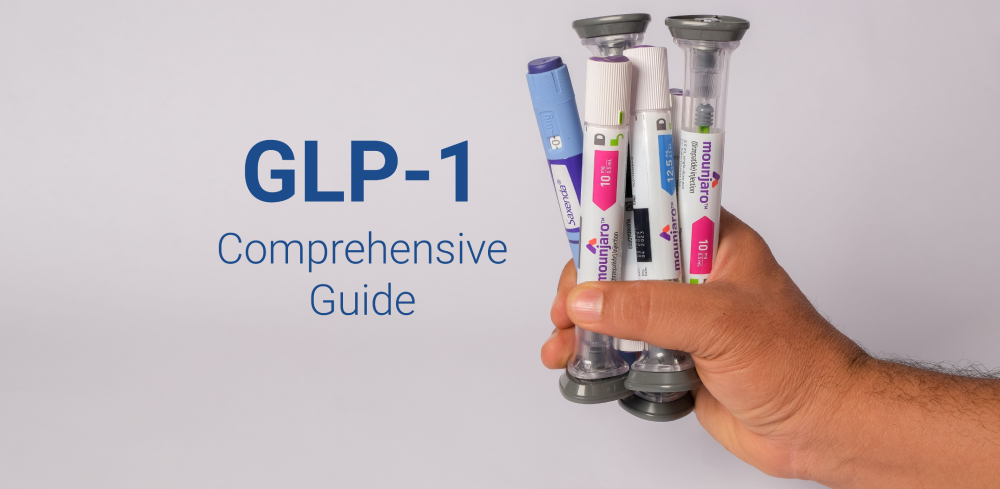
Semaglutide: A Game-Changer in Weight Loss and Type 2 Diabetes Management
Update Date July 19 2024


Eli Luft, PA-C
Dr. Paul Rivas
Key Takeaways
- Effective Mechanism: Semaglutide suppresses appetite, enhances insulin secretion, and slows food passage through the gut, leading to reduced caloric intake and improved weight management.
- Patient-Centered Care: Rivas Medical Weight Loss provides customized treatment plans and affordable access to FDA-regulated compounded semaglutide.
- Addressing Shortages: The high demand for semaglutide has led to shortages and increased costs. Rivas Medical Weight Loss secures reliable supplies and negotiates favorable pricing for patients.
- Comprehensive Solutions: Booking an appointment with Rivas Medical Weight Loss ensures access to personalized care, innovative treatments, and affordable semaglutide for sustainable weight loss success.
Introduction to Semaglutide
Semaglutide is a glucagon-like peptide-1 (GLP-1) receptor agonist used to treat type 2 diabetes and obesity. It mimics the effects of GLP-1, a hormone produced in the intestines after eating. Semaglutide suppresses appetite, enhances insulin secretion, and slows down the passage of food through the gut, leading to reduced caloric intake, which is essential for weight management and blood sugar control [1].
Semaglutide is available in several brand-name formulations, including Ozempic, Wegovy, and Rybelsus, with injectable and oral options. Ozempic and Rybelsus are FDA-approved for diabetes management, while Wegovy is FDA-approved for weight loss. Clinical trials have shown significant improvements in blood glucose control and weight loss compared to placebo and other standard diabetes medications [2]. Additionally, a higher-dose oral version of semaglutide is currently in phase 3 trials, potentially offering even more options for patients in the future.
Benefits of Semaglutide
In addition to its primary indications, semaglutide shows promise in treating other conditions like fatty liver disease, high cholesterol, high blood pressure, and nonalcoholic steatohepatitis. Ongoing research may further solidify its role in addressing a range of metabolic and cardiovascular disorders [4].
Semaglutide has also shown benefits in cardiovascular outcomes, with studies indicating a reduction in major adverse cardiovascular events. This makes it a dual-purpose drug, not only managing diabetes and weight but also contributing to cardiovascular health, a significant concern for many patients with obesity and type 2 diabetes.
Potential Side Effects of Semaglutide
While generally safe, semaglutide can cause side effects such as nausea, vomiting, and diarrhea. These symptoms are usually temporary and tend to diminish as the body adjusts to the medication. However, it’s crucial for patients to be aware of these potential side effects and to communicate with their healthcare provider if they experience any discomfort [6].
Certain individuals with specific medical histories should avoid semaglutide. For example, those with a personal or family history of medullary thyroid carcinoma (MTC) or multiple endocrine neoplasia syndrome type 2 (MEN 2) are advised against using this medication due to the potential risk of these conditions [5].
Monitoring by healthcare providers is essential to minimize the risk of adverse events. At Rivas Medical Weight Loss, we offer weekly visits, which not only enhance safety but also improve accountability, leading to better outcomes, weight loss, and overall success.
The Cost of Semaglutide Without Insurance
The cost of semaglutide can vary significantly depending on the brand and dosage. For example, a 30-day supply can range from $935.77 to $1,349.02 . These high costs are partly due to the drug’s popularity and effectiveness in promoting weight loss and cardiovascular health improvement. Increased demand and patent protection also contribute to the elevated prices and occasional shortages.
The high cost can be a barrier for many patients, particularly those without insurance coverage. Understanding these financial aspects is crucial for patients considering semaglutide as a treatment option.
Is Semaglutide Worth the Cost?
Despite the high costs, semaglutide’s potential health benefits may outweigh the financial burden for many patients. Effective management of obesity and related comorbidities can lead to significant long-term savings in healthcare expenses. Clinical trials have demonstrated substantial improvements in blood glucose control and weight loss, making semaglutide a valuable tool for patients struggling with obesity [8].
In addition to direct health benefits, the improved quality of life and reduction in obesity-related complications, such as type 2 diabetes, cardiovascular diseases, and certain cancers, can justify the investment in semaglutide. These long-term benefits can significantly reduce the overall healthcare costs for patients and the healthcare system. Furthermore, patients often experience relief from joint pain and an enhanced overall quality of life, making semaglutide a worthwhile investment for many.
Why There Is A Semaglutide Shortage
The high demand for semaglutide has led to shortages and increased costs. Prescriptions have surged by 300% in the last three years, with over 9 million people currently using it for type 2 diabetes or weight loss [9]. The effectiveness of semaglutide in promoting weight loss and improving cardiovascular health has attracted many individuals, further fueling the demand.
Novo Nordisk, one of the primary manufacturers of semaglutide, has faced significant challenges in meeting this demand. The company was leasing several manufacturing plants, including Catalent, to increase production capacity. However, some of these plants were shut down due to FDA violations related to Good Manufacturing Practices (GMP). These shutdowns have exacerbated the shortage, as the company works to address the regulatory issues and bring the plants back online [7].
The FDA’s inspections and enforcement actions, while necessary to ensure the safety and quality of the drug, have temporarily reduced the availability of semaglutide. This has created a bottleneck in the supply chain, making it difficult for patients to access the medication consistently.
Additionally, the high cost and shortage are driven not only by the manufacturing process but also by the assembly of the drug into injector pens. The complexity and demand for these injector pens further contribute to the challenges in meeting the high demand for semaglutide.
How Rivas Medical Weight Loss Addresses Shortage and Cost Issues
Rivas Medical Weight Loss addresses the shortage and cost issues of semaglutide by offering personalized care, innovative treatments, and affordable pricing. They leverage FDA inspected and regulated compounded semaglutide, which provides a more affordable alternative to brand-name versions. By partnering with licensed compounding pharmacies, Rivas Medical Weight Loss ensures high-quality semaglutide at a fraction of the cost.
Book An Appointment with Rivas Medical Weight Loss
To book an appointment with Rivas Medical Weight Loss, patients can visit their website or call their office directly. Their team of healthcare professionals works closely with patients to develop a customized treatment plan that addresses their specific needs, goals, and challenges.
By putting patients first and continuously innovating, Rivas Medical Weight Loss sets a new standard for weight management care. Don’t let the shortage and high costs of semaglutide hinder your weight loss goals. Book an appointment with Rivas Medical Weight Loss today and take the first step towards a healthier, happier you.

Lose Weight. Feel Great.
Rivas Medical Weight Loss is here to guide you
with expert care and top quality medication.
Book Appointment
Bibliography
- Drucker D. J. (2018). Mechanisms of Action and Therapeutic Application of Glucagon-like Peptide-1. Cell metabolism, 27(4), 740–756. https://doi.org/10.1016/j.cmet.2018.03.001
- Marso, S. P., Bain, S. C., Consoli, A., Eliaschewitz, F. G., Jódar, E., Leiter, L. A., Lingvay, I., Rosenstock, J., Seufert, J., Warren, M. L., Woo, V., Hansen, O., Holst, A. G., Pettersson, J., Vilsbøll, T., & SUSTAIN-6 Investigators (2016). Semaglutide and Cardiovascular Outcomes in Patients with Type 2 Diabetes. The New England journal of medicine, 375(19), 1834–1844. https://doi.org/10.1056/NEJMoa1607141
- Wilding JP, Batterham RL, Calanna S, et al.:Once-weekly semaglutide in adults with overweight or obesity. N Engl J Med. 2021, 384:989-1002.10.1056/NEJMoa2032183
- Marso, S. P., Bain, S. C., Consoli, A., Eliaschewitz, F. G., Jódar, E., Leiter, L. A., Lingvay, I., Rosenstock, J., Seufert, J., Warren, M. L., Woo, V., Hansen, O., Holst, A. G., Pettersson, J., Vilsbøll, T., & SUSTAIN-6 Investigators (2016). Semaglutide and Cardiovascular Outcomes in Patients with Type 2 Diabetes. The New England journal of medicine, 375(19), 1834–1844. https://doi.org/10.1056/NEJMoa1607141
- FDA approves Wegovy (semaglutide) injection for chronic weight management in adults with obesity or overweight with at least one weight-related condition. https://www.fda.gov/news-events/press-announcements/fda-approves-new-drug-treatment-chronic-weight-management-first-2014
- Nauck, M. A., Quast, D. R., Wefers, J., & Meier, J. J. (2021). GLP-1 receptor agonists in the treatment of type 2 diabetes – state-of-the-art. Molecular metabolism, 46, 101102. https://doi.org/10.1016/j.molmet.2020.101102
- Inside the Catalent FDA citation said to trigger Novo Nordisk’s Wegovy supply hiccup. https://www.fiercepharma.com/manufacturing/inside-catalent-fda-citation-allegedly-at-heart-novo-nordisk-s-wegovy-supply-hiccup
- Tan, H. C., Dampil, O. A., & Marquez, M. M. (2022). Efficacy and Safety of Semaglutide for Weight Loss in Obesity Without Diabetes: A Systematic Review and Meta-Analysis. Journal of the ASEAN Federation of Endocrine Societies, 37(2), 65–72. https://doi.org/10.15605/jafes.037.02.14
- Kushner, R. F., Calanna, S., Davies, M., Dicker, D., Garvey, W. T., Goldman, B., Lingvay, I., Thomsen, M., Wadden, T. A., Wharton, S., Wilding, J. P. H., & Rubino, D. (2020). Semaglutide 2.4 mg for the Treatment of Obesity: Key Elements of the STEP Trials 1 to 5. Obesity (Silver Spring, Md.), 28(6), 1050–1061. https://doi.org/10.1002/oby.22794





